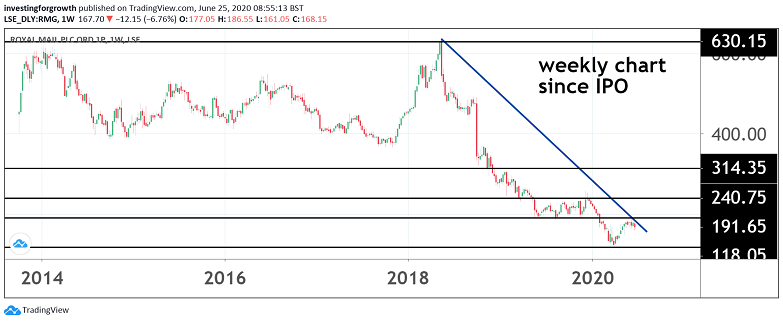Royal Mail: profits dive, jobs cut, shares slump
Britain’s top postie has flagged another turnaround plan. Our head of markets examines its latest idea.
25th June 2020 09:52
by Richard Hunter from interactive investor
Britain’s top postie has flagged another turnaround plan. Our head of markets examines its latest idea.

Royal Mail (LSE:RMG) clearly needs sorting and the latest plan to transform the business seeks to address its legacy issues.
The main thrust of the strategy is for the business to be an internationally-focused parcel business, as opposed to the traditionally UK-focused letters business.
Of itself, this transformation is not only obvious and required but long overdue. The traditional letters market has been in terminal decline for some considerable time, whereas parcels have grown exponentially over recent years given the inexorable rise in online shopping. This has come into even sharper focus during the pandemic and may yet turn out to be the catalyst the business required.
The General Logistics Systems (GLS) overseas parcels business is both the focus of the new strategy as well as currently punching above its financial weight. In these latest figures, the unit has contributed 64% of group adjusted operating profit despite only being responsible for 30% of group revenues.
- Chart of the week: is FTSE 100 on a cliff edge?
- The winners of lockdown and the firms fit for a post-Covid world
- Five most-held dividend stocks among the biggest income funds
The pandemic has brought some pressure to bear as some businesses have effectively closed during lockdown, affecting business-to-business (B2B) volumes.
By the same token, the increase in online purchases by the consumer during the enforced lockdown has been positive for the B2C element of the mix.
Revenues have grown by over 6% excluding acquisitions and operating profits by 13.5%. Meanwhile, adjusted operating margin has also edged higher to stand at 6.6% and in the period since the end of March to which these results run, there has been an increase of 15% in revenues.
However, while opportunities clearly exist at GLS, it is the UK business where the issues largely lie. Royal Mail has seen another significant decline in letter volumes, with advertising mail understandably having fallen off a cliff over recent months.
Adjusted operating costs have risen by nearly 3%, and this part of the group has seen a decline in adjusted operating profit of 41%.
The current trading environment is little better, with letter revenues and volumes down 23% and 33% respectively, although parcel revenues and volumes have shown impressive increases of 28% and 37%.

Source: TradingView. Past performance is not a guide to future performance.
From a group perspective, the recent departure of the CEO adds further complications, the traditional noose of the Universal Service Obligation – the one-price-goes-anywhere service - in the UK needs to be streamlined and perhaps negotiated, while any transformation will come at a cost.
The group has already shelved the final dividend, which is a 70% decline on the full-year payout and which removes one of the last remaining reasons for long-suffering investors to stay with the stock.
Capital expenditure will be reduced by £300 million over the next couple of years, while a general flattening of the structure should result in a saving of over £130 million in staff costs, at the expense of several thousand jobs.
However, this could also lead to further fractious conversations with the unions, whose presence is never far away.
For the moment, the group’s financial position remains strong. The significant hike in trading cash flow and the avoidance of costs totalling £188 million is underpinned by total liquidity of £1.9 billion.
However, some of this will again be eroded as the group expects the current year to remain materially loss-making.
- UK income investors at risk of owning the same shares
- Take control of your retirement planning with our award-winning, low-cost Self-Invested Personal Pension (SIPP)
The history of Royal Mail as a listed business unfortunately confirms a sorry tale. From the initial IPO price in 2013 of 330p, the shares peaked in May 2018 at around 630p, but currently stand at around 170p.
From a lower base the shares have risen 19% over the last three months, but have nonetheless declined 13% over the last year, which compares to a drop of 11% for the wider FTSE 250 index. This update may offer some glimmers of hope, but in terms of investor patience, much of the damage has been done. As such, the market consensus of the shares as a ‘sell’ is likely to remain intact.
These articles are provided for information purposes only. Occasionally, an opinion about whether to buy or sell a specific investment may be provided by third parties. The content is not intended to be a personal recommendation to buy or sell any financial instrument or product, or to adopt any investment strategy as it is not provided based on an assessment of your investing knowledge and experience, your financial situation or your investment objectives. The value of your investments, and the income derived from them, may go down as well as up. You may not get back all the money that you invest. The investments referred to in this article may not be suitable for all investors, and if in doubt, an investor should seek advice from a qualified investment adviser.
Full performance can be found on the company or index summary page on the interactive investor website. Simply click on the company's or index name highlighted in the article.